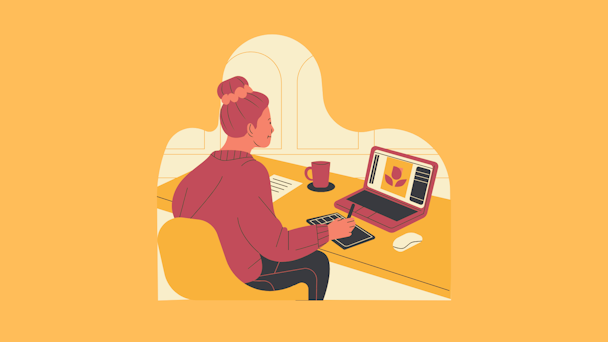We need a better word for freelancing, it’s selling women short
Becolourful's Emily Penny stands up for flexible workers, many of whom are women with care commitments.

Flexibility at work is important for women, but employment will never suit everyone. Freelancing is as inclusive as work gets, enabling individuals to operate on their terms. But the term has negative connotations. We need a more empowering way to describe it.
I’ve worked in the creative industry since 1996, in in-house roles at London agencies before moving out of town after I had my second child and setting up on my own. Today, 30% of my work is via creative agencies and the other 70% is direct for clients. A handful of other independents work with me on and off as part of my team. It’s a set-up that mirrors a wave of micro studios that don’t fit into the classic creative landscape: not quite freelance, not quite agency.
Advertisement
It’s one of the reasons why we need an alternative word for ‘freelance.’
There is a cluster of issues pertinent for women at work: the need for flexibility, the appeal of independence, and the desire to realize their potential while being fairly rewarded for it.
We all want flexibility; everyone has things they want to do outside of work. But for people in caring roles, whether for children or parents, commitments outside of work can be non-negotiable and incompatible with rigid employment terms.
Women are more likely than men to give up on full-time employed work when they become parents – and this makes flexibility a feminist issue. New Flexible Working laws come into force this April requiring employers to listen to requests for flexibility from day one of employment, but in the greater scheme of things, it’s a minor step.
Advertisement
Flexibility isn’t just about being able to do the school run. Different people work best in different environments, coloured by whether they are living with disabilities, neurodiversity, and menopause, even personality and biorhythm are factors. Culturally, society is slowly moving in the right direction (I think); BCorp certification includes standards relating to staff wellbeing and many businesses want that badge.
In an ideal world, women would be able to stay in employed roles where they can realize their potential if that’s what they want. Heck, businesses should want them; evidence shows that more women in the leadership team correlates to greater innovation. But here are the stats: 63% of design students are women, but only 17% of design leaders. Women tend to leave and take their fabulous, creative, innovative brains with them.
Of course, not everyone wants to be employed. As an exhausted mother of young children, I was happy (OK, relieved) to give up my commute and long hours. But, more than that, I was excited about starting my own venture too. Many strong-minded, creative people don’t fit in corporate environments. They ask too many questions and rail against the systems and processes. Perhaps their work is more of a vocation and happens at unusual hours when inspiration strikes, so the only route is to go it alone.
Suggested newsletters for you
We need flexibility in the workplace for those who want it, but let’s also embrace models that enable independence. The pandemic sparked an exodus from London and normalized remote working, laying the foundations for a vibrant freelance workforce. Great news for those of us who were already working remotely in the provinces and for those who work better in their own space.
Being a ‘founder’ – even as a freelance business of one – has never been more fashionable and more supported by peer groups, courses and coworking spaces. For many people under 40, having one’s own hustle seems more aspirational (or more achievable) than having one’s own home. Quite a different mindset from the majority of Gen X-ers.
The upshot is there are now 4 million freelancers in the UK and I’d guess that a huge number of those are women working in the creative industry: writers, designers, illustrators, strategists, and marketers. I’m surrounded by them. We’re lucky in these professions because we can, all we need is a laptop.
This is a largely-invisible and highly productive cottage industry. Let’s hazard an educated guess and say a quarter of every creative agencies are resourced with contractors: independents are shoring up the creative industry. We are the creative industry’s secret brainpower, a vast volume of white-labeled white-collar workers building agency portfolios and credentials. Those big award-winning creative ideas were in part created at a kitchen table and pyjamas may have been worn. But do independents get the recognition they deserve?
I don’t want women to stop freelancing, I want them to be enabled, supported and respected – because this in itself is feminism in action. It makes a difference.
But here’s my suggestion: can we please ditch the word ‘freelance’? The silent ‘just’ is too audible for me, and I want to be seen as a grown-up professional. Coming from an agency background, I can’t shake the association with holiday cover or panic-bought resource. With its military origin (lance for hire), the word offers nothing of relevance to the creative industry and does nothing to build the image of this proficient community of legends whose skills often exceed those of the in-house team by virtue of their varied experience.
Think about it. Writers, designers, marketers: you don’t have to prefix your profession with ‘freelance.’ Solo plumbers, electricians, psychotherapists, driving instructors, accountants, and window cleaners simply say what they do. My point here is that when you set up as a solo independent, you become a business owner, even if you’re contracting. So own that, and act like it. Personal branding is actually business branding. You are a business.
There is an exciting emergence of new collective models that offer an alternative to classic, bricks-and-mortar creative agencies. These embrace the agility, diversity, and expertise of teams resourced with independents into a virtue, and clients appear to be receptive. It feels like the way forward. It brings into question what an agency brand is if not its people; the agency becomes the glue. Which is all it ever really was as the same community of creatives circulate through similar jobs.
What’s the alternative to ‘freelance’?
For me, ‘Independent’ is preferable. ‘Solo’ is an option. Even ‘consultant,’ if it feels relevant. Or how about we cut to the chase and replace it with ‘shit-hot.’
So next time somebody asks you what you do, you can say: I’m a shit-hot writer, designer, illustrator, strategist, or marketer. Because that’s much, much closer to the truth.
Emily Penny is a shit-hot founder of Becolourful. She partners with creative agencies and brand owners to boost their capabilities in brand strategy and verbal identity.
Check out The Drum’s International Women's Day coverage here.

